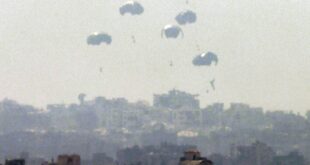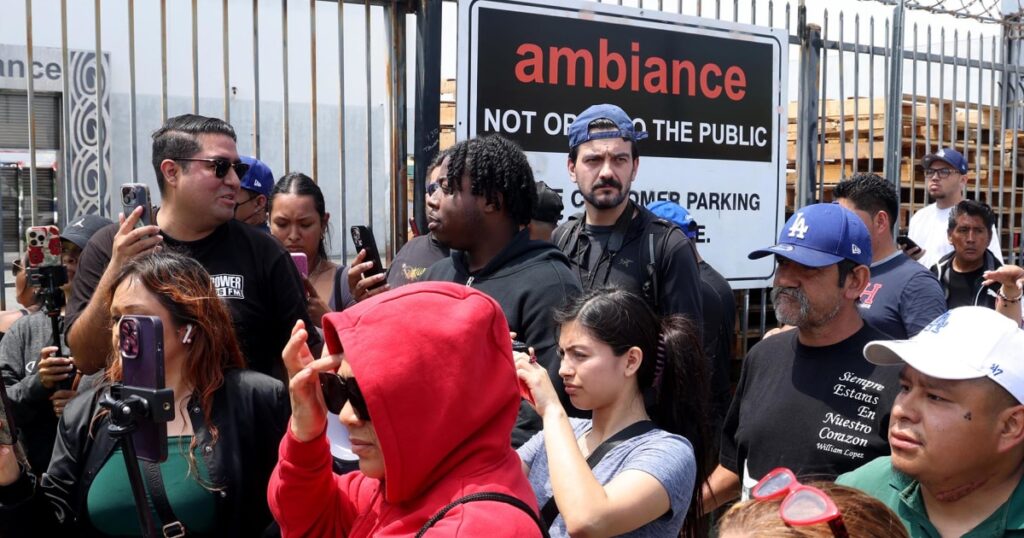
LOS ANGELES — Four days of unrest in Los Angeles over President Donald Trump’s push to increase immigrant arrests and deportations have led to the arrests of at least 56 people, clashes between protesters and law enforcement officials and the deployment of the National Guard and the Marines in the country’s second-largest city.
How did this happen?
The tensions started Friday, when Immigration and Customs Enforcement officers and others arrested over 40 immigrants in raids targeting day laborers at a Home Depot parking lot and workers at the Ambiance Apparel clothing manufacturer, searching for “fictitious employee documents.”
As news of the raids spread fear and panic, relatives and protesters arrived to confront the federal agents wearing camouflage and bulletproof vests.
Some protesters tried to stop vehicles carrying detained immigrants or used other methods to block arrests.
Soon the clashes turned violent, with officers using pepper spray and batons, pushing crowds back with riot shields as some protesters fled or retaliated. A prominent labor leader was among those arrested. The protests spread from downtown Los Angeles into the communities of Paramount and Compton, where rumors of arrests also added to the flaring tensions.
Trump, acting without agreement from state leaders, called in the California National Guard on Saturday. By Sunday, the troops, outfitted with heavy military equipment, had moved into the streets of downtown Los Angeles in a show of force in the state with the largest immigrant population.
Trump said on his social media site, Truth Social, that he had directed the homeland security and defense secretaries and Attorney General Pam Bondi “to take all such action necessary to liberate Los Angeles from the Migrant Invasion, and put an end to these Migrant riots.”
But the clashes dragged on through the day and into the night, with looting and driverless cars’ being set on fire.
The families of the arrested immigrants have accused the government of “kidnapping” their loved ones. Meanwhile, the presence of the troops has set up a battle between the Trump administration and lawmakers in a state that is known for its liberal immigration policies.
‘I don’t know where they’ve taken him’
About two dozen members of the detained workers’ families showed up to a rally and news conference outside Ambiance Apparel on Monday, holding up homemade signs with photos of their loved ones next to birthday cakes, holding their kids and smiling.
“It has been incredibly painful to witness the arrest of my father and of his co-workers,” said Saraí Ortiz, who said her father, José Ortiz, was among those arrested.
“My father gave 18 years of his life to this company,” she said at a news conference outside the site of the raid Friday. “He was always here. He was a loyal worker.”
At least four people at the news conference said they hadn’t received updates from immigration authorities or been able to communicate with their detained family members.
Jerónimo Martínez, 39, said in an interview through an interpreter that he’s worried about Lázaro Maldonado, his nephew, because the family hasn’t had any communication with him since Friday.
“I don’t know where they’ve taken him,” Martínez said. “I don’t know what place he might be in, so I am worried.”
A young man who identified himself as Carlos said he considers his brother, José, to have been “kidnapped,” because his brother was taken by force in the Ambiance raid and is being held without being able to contact relatives or lawyers, which he said is the definition of kidnapping.
“The only crime he committed was trying to live a better life and trying to get ahead and work. Because of that dream, I had to witness him being chained up like he was some dangerous animal. The whole process wasn’t just inhumane; it was illegal,” Carlos said.
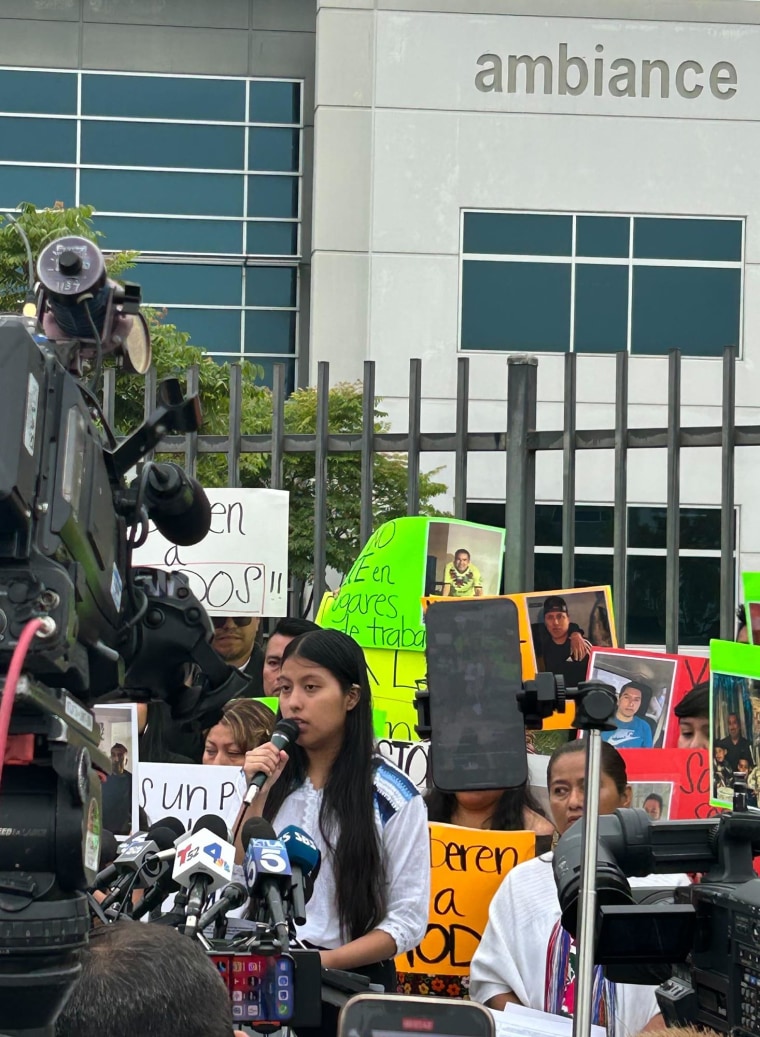
Trump also mobilized about 700 Marines on Monday to support the National Guard in protecting federal personnel and property, U.S. Northern Command said in a statement.
California Gov. Gavin Newsom blamed anarchists and troublemakers for the fires and any violence, not peaceful protesters, but he said, “Donald Trump at the end of the day is the sponsor of these conditions.” Los Angeles Mayor Karen Bass said in a statement on X that “Trump didn’t inherit a crisis — he created one.”
California Attorney General Rob Bonta sued the Trump administration for federalizing the state’s National Guard troops and deploying them to quell protests over objections of California government leaders.
The raids were a striking departure by the administration from Trump’s campaign statements that his plans for mass deportation would focus on violent immigrant criminals.
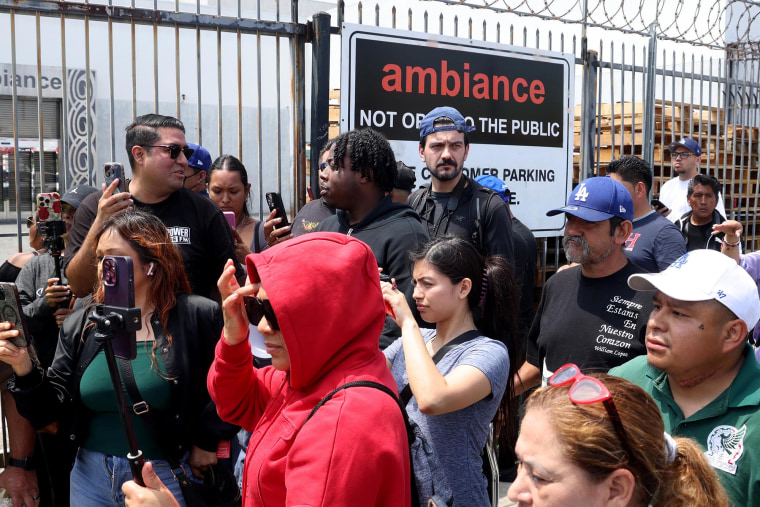
The raids follow weeks of ICE officers and other federal agents’ showing up at immigration courts across the country, including in California, to arrest people as they left the courthouses where their cases were dismissed.
Those arrests have been accompanied by video on social media or captured by news outlets of some family members being arrested and of young children standing nearby as a parent or parents are handcuffed or restrained with zip ties.
Increasingly, people are seeing ICE arrest and take away immigrants who’ve lived and worked in the United States for years or are part of their community, including people who are seeking asylum or had other temporary legal protection from deportation.
NBC News reported last week that White House deputy chief of staff Stephen Miller, angry over what he saw as low numbers of arrests and deportations, ordered senior ICE officials to begin detaining 3,000 migrants a day or be fired.
Amid the turmoil, ICE was already ramping up arrests by using thousands more federal law enforcement personnel and up to 21,000 National Guard troops in what it had dubbed “Operation At Large,” NBC News reported.
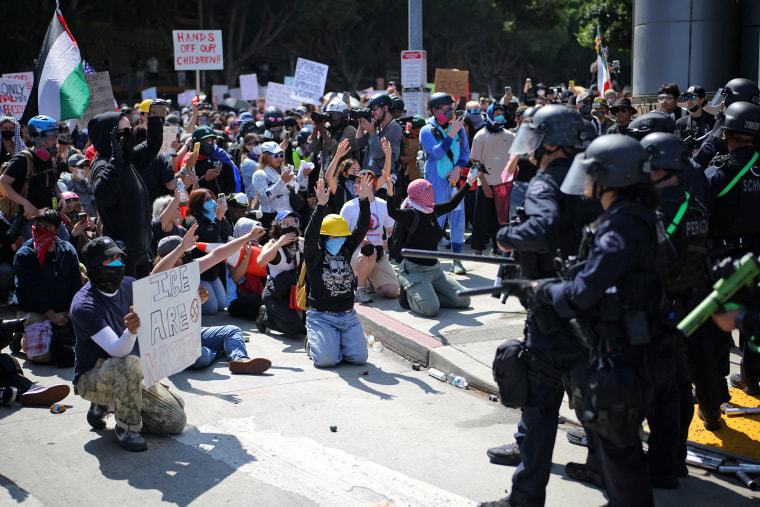
Before the clashes in Los Angeles, smaller confrontations between protesters and law enforcement had begun to erupt in other cities around the country. In Chicago on Wednesday, chaos unfolded as protesters confronted ICE officers over arrests during scheduled check-ins with immigration officials.
In San Diego, a surprise raid by armed federal officers at a popular Italian restaurant drew protests. Officers dispersed the crowd with what were identified as flash bang grenades.
In Los Angeles, protests and tensions continued.
Tyler Kingkade reported from Los Angeles and Suzanne Gamboa from San Antonio.
 Latest World Breaking News Online News Portal
Latest World Breaking News Online News Portal


